The Benefits of Utilizing Zoom Hybrid Depositions

The legal profession has swiftly adapted to the digital era, embracing technological advancements that enhance efficiency, reduce costs, and provide greater flexibility. One such innovation is the integration of Zoom hybrid depositions, which seamlessly blend traditional deposition practices with the power of video conferencing. In this blog post, we delve into the reasons why attorneys are increasingly favoring Zoom hybrid depositions and the benefits they bring in today’s fast-paced legal landscape.
Enhanced Convenience and Efficiency:
Zoom hybrid depositions offer attorneys unparalleled convenience and efficiency. By leveraging video conferencing technology, attorneys can conduct depositions remotely, eliminating the need for extensive travel. This saves valuable time and resources, enabling attorneys to allocate their efforts to other critical aspects of their caseload. Additionally, scheduling becomes more flexible as participants can join the deposition from various locations, accommodating their availability and minimizing scheduling conflicts.
Cost-Effectiveness:
Traditional in-person depositions often incur substantial travel expenses, including accommodation and transportation costs. Zoom hybrid depositions significantly reduce these expenses, making them an attractive option for attorneys. Conducting depositions remotely allows attorneys to utilize their resources more efficiently, ensuring cost-effective legal representation for their clients without compromising the quality of the deposition process.
Expanded Access to Witnesses and Experts:
Zoom hybrid depositions overcome geographical barriers, granting attorneys access to witnesses and experts who may be located far away or in different jurisdictions. This broader reach empowers attorneys to secure crucial testimonies without the logistical challenges associated with travel and coordination. As a result, attorneys can build stronger cases by tapping into a wider pool of knowledgeable and relevant witnesses.
Flexibility in Document Sharing:
Traditional depositions frequently rely on physical copies of documents and exhibits. In contrast, Zoom hybrid depositions enable attorneys to digitize the process, facilitating seamless sharing of electronic documents. With screen-sharing capabilities, attorneys can present exhibits in real-time, ensuring all participants have simultaneous access to the materials. This digital approach promotes efficiency, collaboration, and a streamlined deposition experience.
Improved Focus and Engagement:
Contrary to concerns about virtual interactions leading to distractions, Zoom hybrid depositions can actually enhance focus and engagement. Attorneys retain a central role in the deposition, directing questioning and effectively managing the proceedings. Additionally, the virtual environment can reduce interruptions and disruptions, creating a more fluid and focused deposition experience.
The emergence of Zoom hybrid depositions has revolutionized attorneys’ approach to depositions, offering convenience, cost-effectiveness, and expanded access to witnesses and experts. Embracing this technology allows attorneys to streamline their workflow, improve efficiency, and ultimately provide enhanced legal services to their clients. As the legal profession continues to evolve, Zoom hybrid depositions have emerged as a valuable tool, empowering attorneys to navigate the complexities of modern litigation effectively.